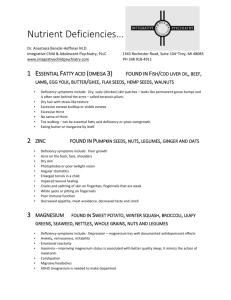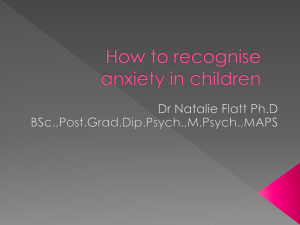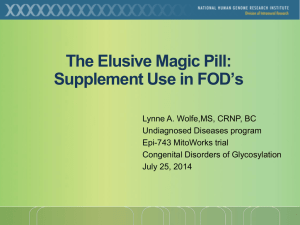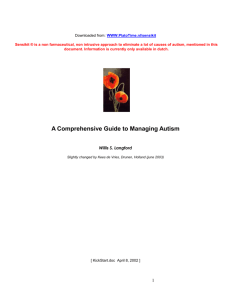Anastasia Hoffman PP Presentation Strategies to Grow A Healthy
advertisement
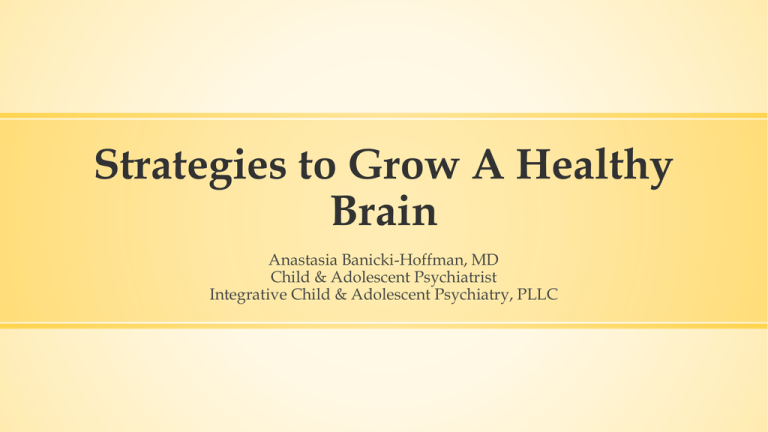
Strategies to Grow A Healthy Brain Anastasia Banicki-Hoffman, MD Child & Adolescent Psychiatrist Integrative Child & Adolescent Psychiatry, PLLC Cholesterol ▪ The brain is the most cholesterol rich organ in the body ▪ 60% of the brain weight is FAT ▪ The optimum cholesterol level appears to be between 160 and 200 mg/dL blood serum ▪ Cholesterol levels below 160 mg/dL is associated with increased mortality and increased risk of psychiatric disorders, neurological disorders, infectious diseases, and cancer ▪ Low cholesterol decreases the number of serotonin receptors in the brain Risks from low total cholesterol ▪ Increased rate of school suspension ▪ Increased violent behavior and aggression ▪ Increased anxiety ▪ Increased suicide ▪ Increased depression and bipolar disorder ▪ Increased cancer ▪ Increased chronic fatigue syndrome ▪ Increased stroke rate ▪ Increased infection susceptibility such as gastrointestinal infections What is your child’s cholesterol level? ▪ Know your child’s cholesterol level ▪ Cholesterol is the precursor of all of our hormones (steroid hormones, estrogens, testosterone, cortisol, and aldosterone) ▪ Cholesterol is needed for fat digestion and vitamin absorption ▪ Foods rich in cholesterol are egg yolks, liver, shrimp Essential Fats ▪ All cell membranes in the body contain fat ▪ Fat is especially important to the brain ▪ Fat makes up 60% of our brain with 25% being DHA (docosahexaenoic acid), the most abundant fat in the brain ▪ Essential fatty acids cannot be made by the body and must be taken in through diet ▪ Two specific omega 3’s are important to brain health: EPA & DHA ▪ Neurotransmitters – Every aspect of neurotransmission involves adequate functioning of omega 3’s Symptoms of Essential Fatty Acid Deficiency ▪ Dry, scaly (chicken) skin patches – looks like permanent goose bumps and is often seen behind the arms – called keratosis pilaris ▪ Dry hair with straw-like texture ▪ Excessive earwax buildup or visible earwax ▪ Excessive thirst ▪ No sense of thirst ▪ Toe walking – can be essential fatty acid deficiency or yeast overgrowth ▪ Eating butter or margarine by itself Essential Fatty Acids ▪ Where Do I get this from? ▪ Food – fish, nuts & seeds, beef, lamb, egg yolk, butter/ghee, flax seeds, hemp seeds, walnuts & algae based DHA ▪ Fish oil/cod liver oil supplements – liquid or gel caps – not gummies ▪ Avoid processed foods ▪ What are the side effects of fish oil? ▪ Too much fish oil can cause loose stool or tummy ache ▪ Avoid if you have a fish allergy ▪ Theoretically, it can act as a blood thinner (above 3000mg) – stop 1-2 weeks prior to any elective surgery ▪ Hyperactivity in children with a carnitine or taurine deficiency How to Read Fish Oil Labels ▪ Don’t look at the how much fish oil the front of the bottle claims ▪ Look at the label on the back of the bottle ▪ Look at the serving size ▪ Look at DHA & EPA ▪ Look at Total Omega 3 Zinc ▪ Involved in more than 300 enzyme and hormone pathways ▪ Zinc is needed to make dopamine & serotonin, the neurotransmitters involved in focus and mood ▪ Many medications prevent zinc uptake (especially acid reflux medications) ▪ Those at greatest risk of zinc deficiency are vegetarians because of a lack of red meat and poultry intake ▪ Strongly associated with picky eating Duties of Zinc ▪ Aiding in the manufacture of DNA and proteins ▪ Assisting the immune system as it fights off viruses and bacteria ▪ Helping wounds heal ▪ Regulating neurotransmission in the brain ▪ Making it possible to taste and smell ▪ Aiding in the synthesis of all enzymes required to digest fats, carbohydrates and protein Physical Symptoms of Zinc Deficiency ▪ Poor growth ▪ Acne on the back, face, shoulders ▪ Dry skin ▪ Photophobia or poor twilight vision ▪ Angular stomatitis ▪ Enlarged tonsils in a child ▪ Impaired wound healing ▪ Cracks and splitting of skin on fingertips, fingernails that are weak ▪ White spots or pitting on fingernails ▪ Poor immune function ▪ Zinc is also critical for smell and taste Physical Symptoms of Zinc Deficiency Angular stomatitis Meuhreke’s lines How does low zinc affect your brain? ▪ Decreased appetite and meat avoidance ▪ Decreased taste and smell ▪ Insomnia and poor sleep habits ▪ Depression ▪ Attention difficulties ▪ Bloating and Gastrointestinal discomfort ▪ Poor essential fatty acid metabolism How does low zinc affect your brain? ▪ In ADHD: Zinc is a cofactor for dopamine synthesis which affects mood & concentration ▪ Low zinc depresses both melatonin and serotonin production which affect information processing & behavior in ADHD ▪ Low zinc contributes to poor cognitive function Nutrient Dense Foods Zinc ▪ Pumpkin seeds ▪ Nuts ▪ Legumes ▪ Ginger ▪ Oats Magnesium ▪ Magnesium is a mineral used by the body in more than 300 processes ▪ One of the first minerals to disappear from food when processed and one of the first minerals to leave the body when there is stress ▪ Has been used for a long time for sore muscles (ie Epsom salt = magnesium sulfate) ▪ The “anti-stress” mineral ▪ Helps regulate blood sugar levels & blood pressure ▪ Helps keep bones strong ▪ Needed for normal muscle and nerve function Symptoms of Magnesium Deficiency ▪ Depression – magnesium has well documented antidepressant effects ▪ Anxiety, nervousness, irritability ▪ Emotional reactivity ▪ Insomnia – improving magnesium status is associated with better quality sleep; it mimics the action of melatonin ▪ Constipation ▪ Migraine headaches ▪ ADHD (magnesium is needed to make dopamine) ▪ Is usually low in hyperactive children ▪ Difficulty with memory and concentration ▪ Tics, muscle jerks and spasms Symptoms of Magnesium Deficiency ▪ In ADHD: Magnesium deficiency is linked to poor function of neurotransmitters that control emotion, social reactions, hyperactivity and attention. ▪ In anxiety: Magnesium regulates the HPA axis which controls physical and physiological reactions to stress ▪ In anxiety: Magnesium deficiency can induce anxiety and emotional hyperreactivity Causes of magnesium depletion ▪ Stress ▪ Caffeine ▪ Soft drinks ▪ Alcohol ▪ Medications ▪ Processed foods Nutrient Dense Foods ▪ Magnesium ▪ Sweet potato ▪ Winter squash ▪ Broccoli ▪ Leafy greens ▪ Seaweed ▪ Nettles - Weeds? If you can't beat them, eat them! ▪ Whole grains ▪ Nuts ▪ Legumes Vitamin B12 ▪ A family of compounds manufactured by bacteria, fungi & other organisms ▪ It has roles in forming red blood cells ▪ B12 works in conjunction with B6 and folic acid to manufacture serotonin and dopamine ▪ Vitamin B12 normal blood level range is between 200-1100 pg/mL ▪ I recommend supplementation to anyone with a level under 600 pg/mL ▪ Levels below 450 pg/mL are associated with neuropsychiatric problems Vitamin B12 ▪ Low B12 is associated with ▪ Fatigue ▪ Panic disorders ▪ Anxiety ▪ OCD ▪ Depression ▪ Paranoia & hallucinations ▪ Memory loss ▪ Confusion ▪ Outbursts of temper ▪ Behavioral changes Symptoms of Vitamin B12 Deficiency Mental Physical ▪ Irritability ▪ Diminished sense of touch/pain ▪ Personality change ▪ Clumsiness ▪ Depression ▪ Weakness ▪ Poor memory ▪ Tremors ▪ Hallucinations ▪ GI problems ▪ Violent behavior ▪ Anxiety Nutrient Dense Foods ▪ B12 Rich Foods ▪ Liver ▪ Eggs ▪ Fish ▪ Lamb ▪ Beef Vitamin D ▪ Is a pro hormone and NOT a vitamin (it is a hormone precursor) ▪ It comes from two very different sources: food and sunlight ▪ Cholesterol is the precursor to vitamin D ▪ Vitamin D is very much involved in brain function ▪ Ample amounts of vitamin D are necessary for optimal mental health ▪ Know your level – blood test ▪ An optimal vitamin D level is between 50 and 80 ng/mL Vitamin D ▪ Low vitamin D levels are linked to : ▪ Anxiety ▪ May improve symptoms of depression ▪ Psoriasis ▪ Muscle pain and weakness ▪ Elevated blood pressure ▪ Some forms of cancer & autoimmune disease ▪ Seizures Vitamin D ▪ Supplementation is based on blood levels ▪ Supplements usually come in 1000 I.U. (International Units) ▪ Vitamin D is a fat soluble vitamin – so supplements must be taken either with fatty food or fish oil for absorption
